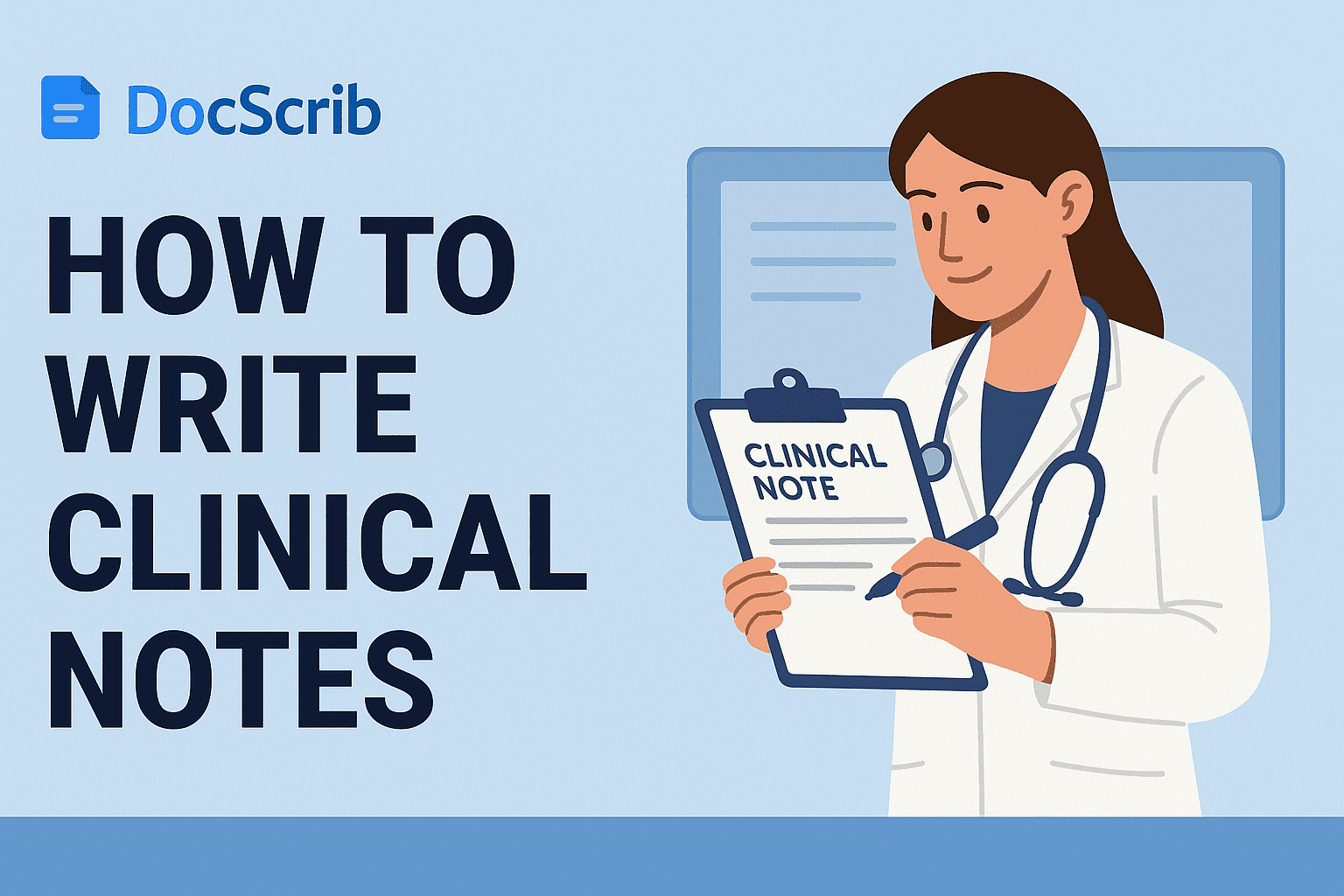Updated on: July 4, 2025
Clinical documentation is the backbone of quality patient care. Whether you’re a seasoned healthcare provider or just starting your career, knowing how to write clinical notes accurately and efficiently is essential for effective communication, legal compliance, and optimal patient outcomes.
At DocScrib, we’re on a mission to simplify documentation for busy clinicians through AI-powered solutions. In this comprehensive guide, we’ll break down everything you need to know about writing professional, accurate, and time-efficient clinical notes.
What are Clinical Notes?
Clinical notes are written records of a patient’s interaction with a healthcare provider. These notes serve multiple purposes:
- Documenting the patient’s symptoms, history, and treatment plan.
- Communicating with other healthcare team members.
- Providing legal protection and supporting billing or insurance claims.
Common types of clinical notes include:
- Progress Notes
- SOAP Notes
- DAP Notes
- Psychotherapy Notes
- Discharge Summaries
👉 Learn more about DocScrib’s AI solutions for smarter documentation
How to Write Clinical Notes: Step-by-Step
1. Start with Patient Information
Include patient name, date of birth, medical record number, and visit date.
2. Record the Subjective Information
This section includes the patient’s own words—symptoms, concerns, or reasons for the visit.
Example: “I’ve been having persistent chest pain for the past two days.”
3. Add Objective Observations
Include measurable data like vital signs, physical exam findings, and lab results.
4. Write the Assessment
Document your clinical evaluation, including diagnoses or provisional impressions.
5. Outline the Plan
Describe the treatment strategy, follow-up instructions, medication changes, referrals, or tests.
6. Use Standard Formats (SOAP or DAP)
Choosing a consistent framework helps ensure clarity and legal compliance.
👉 Download Free SOAP and DAP Note Templates
Best Practices for Writing High-Quality Clinical Notes
- Be Concise but Comprehensive: Avoid unnecessary details but cover key facts.
- Use Clear, Professional Language: Avoid slang and stick to medical terminology.
- Maintain Objectivity: Separate personal opinions from factual observations.
- Ensure Privacy and Compliance: Keep patient information confidential and follow HIPAA guidelines.
- Review and Revise: Always double-check for accuracy and completeness.
How AI Medical Scribes Like DocScrib Make Clinical Note-Taking Effortless
Clinical documentation can be time-consuming, contributing to clinician burnout. That’s where AI Medical Scribes like DocScrib can help:
- Real-Time Documentation: Capture clinical encounters automatically.
- Generate SOAP, DAP, and Progress Notes Instantly.
- Seamless EHR Integration: Eliminate redundant data entry.
- HIPAA-Compliant & Secure: Protect sensitive information.
By automating routine note-taking, DocScrib helps clinicians spend more time on what matters most—patient care.
👉 Schedule Your Free Demo with DocScrib
Common Mistakes to Avoid in Clinical Notes
- Writing too vaguely or too briefly.
- Using non-standard abbreviations.
- Omitting key observations or follow-up plans.
- Failing to update old information.
Additional Resources for Clinicians
- SOAP vs. DAP Notes: Which Should You Use?
- Free Psychotherapy Note Templates
- Treatment Plan Templates
- AI Medical Scribe for Happier Clinicians — Explore DocScrib
Final Thoughts
Mastering how to write clinical notes is a skill every healthcare professional must develop. By combining proven frameworks like SOAP or DAP with the power of AI Medical Scribes like DocScrib, you can ensure your documentation is accurate, efficient, and patient-centered.
Stay efficient. Stay compliant. Stay patient-first—with DocScrib.
